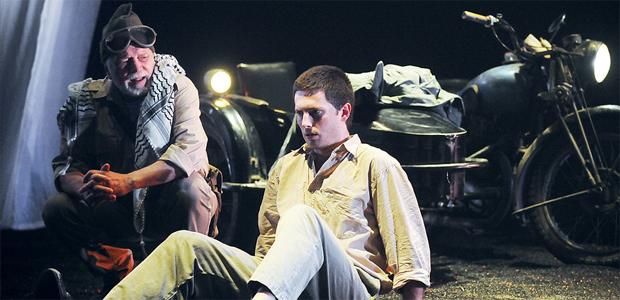Russian Ex-Pats Change the Face of Israeli Theater
A scene from “A Pigeon and a Boy” playing at the Gesher Theater in Tel Aviv, Israel. (Photo courtesy of the Gesher Theater)
Critics are raving about what’s currently playing at Gesher Theater. It’s an adaptation of a classic Israeli novel “A Pigeon and a Boy” about a romance during the 1948 Arab Israeli war. The stage is on a steep tilt, actors perform vignettes framed by flowing beige drapes, and the soundtrack is evocative. There’s an elaborate theatricality at Gesher that you don’t see on many other stages in Israel.
“There’s a long heritage of theater in Russia that we don’t have in Israel,” said Israeli-born actor Yuval Yanai, who performs with Gesher. “The sets are very elaborate. And they are very big. The visual aspect of the theater is very, very important. So, you know, the things we know about theater [are] less evolved than what they know about the theater.”
Russian theater, of course, has a long and storied history: Think Chechov and Pushkin. That tradition found its way to Israel 20 years ago. Lena Krendlin, the director of Gesher, said that as the Soviet Union was collapsing, she and a group of Jewish theater directors sat in her Moscow kitchen and plotted their escape.
“I don’t think we wanted to come to Israel. I think we wanted to leave Russia. Like, you want to go out of the prison. It was the feeling. We wanted fresh air. We thought probably, we will come to Israel, we will establish some theater, and we will live like kings,” Krendlin says.
That’s not exactly how things turned out. She and the group of directors and actors all moved to Israel together. As they were preparing for their first show in 1991, the Gulf War broke out. Iraqi Scuds rained down on Tel Aviv in the middle of rehearsals. They dodged in and out of bomb shelter wearing gas masks. Not a very encouraging start to their new lives. But the war ended just in time for their debut.
“We started with “Rosencrantz and Guildenstern are Dead” by Tom Stoppard. It was a very strange decision by our artistic director. Because everybody told us, you have to start with play about Russian immigrants. It’s supposed to be very familiar, very miserable, very simple. And we started from I think the most complicated play in the world,” she says.
The cast performed it entirely in Russian. Israeli audiences listened to a Hebrew translation through headsets – and they loved it. One newspaper critic hailed Gesher’s debut as “The Russian Miracle of Israeli Theater.” The cast kept performing in Russian, and a few years later, started doing Hebrew versions on alternating nights. The actors still didn’t have a firm grasp of Hebrew – they rehearsed from scripts transliterated into Cyrillic characters.
Backstage, it feels like you’re in Moscow. Stagehands and directors chat in Russian. The costume boxes are all labeled in Russian, too.
On stage, though, it’s somewhere in between Moscow and Tel Aviv. Today all of Gesher’s plays are in Hebrew with Russian and English subtitles projected on a screen above the stage. Some of the actors speak Hebrew in thick Russian accents. But half of the cast doesn’t speak a word of Russian, and neither does most of the audience.
So is it a Russian theater or an Israeli theater?
The director responds, “When we are asked ‘who you are,’ we are starting to think. It’s a sign that we are in between. Probably we are the bridge. You know, our theater, the name of the theater is bridge.” Gesher is Hebrew for bridge.
“One side of the bridge we’re in Russia, and we pass this bridge slowly slowly, and I think now we are close to another side,” Krendlin said.
Gesher Theater is hailed as one of Israel’s leading theaters. Now Gesher’s artistic staff has decided to reveal its secrets: It’s planning to launch a school for aspiring Israeli actors and directors.
